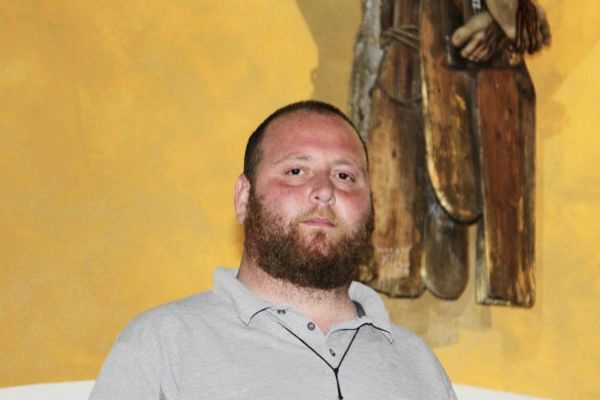- Direct witness: Lampedusa fishers: "Saving migrants in danger is an obligation"
- Migration "For the immigrants of the Open Arms, Lampedusa is what New York was for the Italians"
Carmelo La Magra (San Giovanni Gemini, 1980) is the pastor of Lampedusa, the Sicilian island placed between Sicily, Libya Malta and Tunisia, fundamental to understand the migrations in the Central Mediterranean. "Don Carmelo", as one would say in Italy, has been a priest for 12 years and three specifically here. He admits "not knowing" why he is in Lampedusa: "I have not asked for it, but I have not rejected it either", because I did not want to miss this important "opportunity". He knows well that one thing is to "talk about migration" and another thing is to "live it" first hand. Try to be at each landing with blankets and drinks but, humbly, believe that "will not solve the problems of humanity." But it's a start.
Why is Lampedusa so media?
As always happens here, we live under the spotlights. What is normal in other places, in Lampedusa is an event. The arrival of migrants, numerically, is not significant compared to the rest of Italy. There are people from this country who do not know, or do not want to know, that 80% of migrants come from the Northeast, by land . Nor does everyone who leaves Africa arrive in Lampedusa. It plays with the symbolic. The rulers know, at the image level, that what happens here is valid for all of Italy. The symbolism of Lampedusa is what makes it so media.
Why is immigration scary? You are among people who pray.
They are also afraid of them. The reason, I think, is because we fear facing ourselves. Because when we are facing a different person, the other gets to reveal who we really are. In Lampedusa, as in other places in Italy, tourism is the central axis of the economy, so we are not afraid of the foreigner, but of the poor foreigner. There is no problem in attending 50,000 tourists, but 50 Africans . The problem is the other poor, needy and in difficulty. That, instead of bringing wealth, raises questions. That is why we are also afraid of poverty.
In fact, there is a lot of politics about migration.
It is not the most important problem in Italy. But politicians, in the era of social networks, are in a constant electoral campaign : you have to understand what people like, annoys and scares you. Therefore, many point to fear abroad, to the different, as the axis of political decisions. But also as an element of distraction. Imagine that we close all the borders of Italy: What would change? Nothing. There would still be health, education and unemployment problems. Thus, migrations are used as an element of distraction.
How many people host in Lampedusa? Here are many moving stories.
It is often said that Lampedusans always welcome and that in times of emergency they give the best of their generosity. Which is completely true. But it must also be said that in that 'all', there is not always 'all'.
In the town there are different opinions according to nationalities. Why?
People lament more about Tunisians than sub-Saharan people. Because Tunisian is more like Italians in many ways, as in the way they behave. In the collective imagination, one thinks: "Ok, you are a migrant and I can help you. But you have to be suffering, sad and stripped." That implies that if a migrant is young, he uses his cell phone and has some money, then he has no right : "You have to be worse than me for me to help you," is the idea. We are all good at helping when we are on the pedestal, the problem is when we have to do it equally.
Is a pastor in Lampedusa more involved with the faithful or with the migrants?
Here you cannot separate your mission in both contexts, everything belongs to the same reality. It is very difficult, however, to mediate with the migratory phenomenon if those who arrive are passing through. My main mission is to work with the local community , but with the aim of opening my eyes to an occasion.
They are always new people, then. What do you feel when they arrive? And them?
I try to be present at each landing. Not so much to give relief, although we offer drinks and blankets. Simply because we are the only presence that is neither military nor sanitary . When they arrive, they never raise their heads. They have been sold, mistreated, tortured. The first thing we want is to cross our eyes with them, get a smile. Even at the time of reception, they feel very overwhelmed. The other day, when the 27 children of the Open Arms landed, there were about 40 agents.
The Pope came here in 2013 but people are still dying at sea.
It is important for migrants in the center. We all talk about them, but we don't make them talk. What if now there was an earthquake in Italy? Journalists would go out of their way to interview a person who has been saved. No one would ask: "What is your opinion about the rescued?"
According to the criteria of The Trust Project
Know more- Italy
- Libya
- Open arms
- Tunisia
- Africa
- World
- Health
- Refugees
Immigration The 'non-minor minors' of Matteo Salvini in Lampedusa speak: "This is freedom"
ItalyThe ship 'Alan Kurdi' is heading towards Lampedusa with 40 migrants on board
Immigration The 'excuses' of the Open Arms for not disembarking in Spain: from the "dignity" of immigrants to air travel

